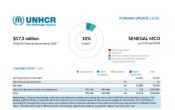Senegal Multi-Country Office
Operation: Senegal Multi-Country Office
Location
{"longitude":-14,"latitude":14,"zoom_level":0,"iso_codes":"'BEN','CPV','GMB','GNB','SEN','SLE','TGO'"}
By clicking on the icons on the map, additional information is displayed.
The boundaries and names shown and the designations used on this map do not imply official endorsement or acceptance by the United Nations.
Key figures
| 2020 planning figures | |
| 14,350 | refugees and 1,710 asylum-seekers in Senegal will be supported with durable solutions, most notably voluntary repatriation |
| 7,000 | refugees will be naturalized in Guinea Bissau |
| 250 | refugee children born in Gambia will be registered |
| 200 | refugees in Gambia will be assisted with acquisition of long-term residence permits |
| 90% | of refugees in Guinea will be engaged in agricultural activities and Income Generating Activities that will enable them to achieve self-sufficiency |
| 2018 year-end results | |
| 6,530 | Mauritanian refugees in Senegal were issued with ID cards to solve the problems faced due to lack of documents |
| 1,960 | birth certificates were issued with the support of UNHCR in Guinea-Bissau during the first six months |
| 1,160 | Ivorian refugees were repatriated from Guinea and Togo to Côte d'Ivoire |
| 19 | refugees in Benin received cash grants for the implementation of income generating activities |
| 10 | refugees in Guinea-Bissau received nationality certificates |
| 7 | refugee households (35 people) in Sierra Leone were locally integrated, and provided with cash grants and resident permits for their mainstreaming process |
People of Concern
7%
Decrease in
2019
2019
| 2019 | 37,554 |
| 2018 | 40,565 |
| 2017 | 52,639 |

[["Refugees",34284],["Asylum-seekers",3125],["Returned refugees",30],["Stateless",115]]
Loading ...
Senegal Multi-Country Office
< Back
2019
{"categories":[2015,2016,2017,2018,2019,2020],"budget":[75.809563009,38.72979498,31.317165885,38.90837605,24.70701174,19.4015267],"expenditure":[32.5813122,18.43963117,19.83492682,21.67521144,19.13530871,null]}
{"categories":[2015,2016,2017,2018,2019,2020],"p1":[46.024679439,36.93162341,29.209452145,34.3867338,22.14226174,17.92466274],"p2":[1.948594,1.79817157,2.10771374,4.52164225,2.56475,1.47686396],"p3":[null,null,null,null,null,null],"p4":[27.83628957,null,null,null,null,null]}
{"categories":[2015,2016,2017,2018,2019,2020],"p1":[21.18515206,17.32054236,18.30306433,20.27862232,17.60353495,null],"p2":[0.8169717,1.11908881,1.53186249,1.39658912,1.53177376,null],"p3":[null,null,null,null,null,null],"p4":[10.57918844,null,null,null,null,null]}
Loading ...
CHOOSE A YEAR
- 2016
- 2017
- 2018
- 2019
- 2020
Working environment
UNHCR’s Regional Representation for West Africa (RRWA) will continue to work with the host governments in the region to coordinate its response programmes and to further durable solutions. RRWA will also continue to directly interface with international bodies, non-governmental organizations (NGOs), academic institutions, as well as regional bodies such as the Economic Community of West African States (ECOWAS) in order to respond to emergencies as well as the challenges of prolonged forced displacement and statelessness. In 2018, UNHCR collaborated with 85 partners, and will continue fruitful partnerships in 2019 to ensure cost effectiveness in implementing activities in various sectors, such as registration, refugee status determination, child and community-based protection, peaceful co-existence, identifying and responding to SGBV, border monitoring, shelter, education, and addressing statelessness.West Africa is the location of important and complex mixed movements, both significant intra-regional movements and key transit routes of flows toward North Africa and Europe. Among people ready to embark on irregular movements and risk these dangerous journeys, there are people seeking international protection. In 2019, efforts will continue to strengthen a coordinated and comprehensive response to ensure respect for the right to seek and enjoy international protection in the context of mixed movements. UNHCR will promote the decentralisation of asylum services, which tend to only be available in capital cities, and support the presence and availability of national asylum authorities in strategic locations in such as border areas and key transit points. In this context, UNHCR will support advocacy with Governments and other key stakeholders, such as the Special Envoy for the Central Mediterranean Situation as well as promote access to protection and solutions for refugees and asylum-seekers. UNHCR will also carry out mass information campaigns to people of concern and support capacity-building activities of the relevant stakeholders
Key priorities
- A series of national quantitative and qualitative studies will be conducted, to enhance understanding of the causes of statelessness in ECOWAS states, to establish a baseline for the purposes of prioritisation, and to assess the impact/efficacy of the planned interventions.
- In Sierra Leone, UNHCR will continue to pursue durable solutions for the remaining refugees in the country including Liberians who have already opted for local integration and are awaiting issuance of Liberian passports
- In Guinea, UNHCR will advocate with the government for accession to the Kampala Convention and drafting of a law or policy on internal displacement.
- In Guinea, UNHCR will work with the government, in addition to continuing the voluntary repatriation of mainly Ivorian refugees, for the development of local integration strategy in order to achieve legal, social and economic integration of refugees.
- In Guinea, documentation, birth registration and new cases, profiling and refugee status determination as well as SGBV case management will be integrated into the national system
- In Senegal, the five objectives of the MYMP strategy for Senegal (2018-2020) will be prioritised in 2019: Improving the performance of the RSD system in Senegal as per international standards; building the independence and self-reliance of POCs, connecting them with the national services and ensuring their effective and meaning participation in Senegalese society; ensuring sustainable durable solutions for PoCs; integration and consideration of vulnerable POCs and coordination, awareness raising and advocacy between all actors.
- UNHCR will strengthen collaboration and partnerships with all stakeholders in the context of asylum and mixed migration in Senegal.
- In Senegal, particular attention will be paid to the livelihood opportunities thus enhancing the capacities of refugees to provide for basic needs.
- In Gambia, UNHCR will continue its strong advocacy with the authorities for administrative and legal integration of Senegalese refugees and for naturalization or for multiyear residence permit status for all refugees living in Gambia. UNHCR will also focus on strengthening existing programmes to facilitate the inclusion of refugees into national programmes and signing of MOUs with 10 identified Government and development/private agencies.
- In Guinea Bissau, UNHCR will pursue the naturalization of 4,269 people by the end of 2019, ensuring the provision of assistance to the naturalized refugees and host communities
- In Togo, voluntary repatriation for Ivorian and income generation activities will be pursued in 2019.



















